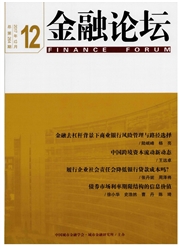

 中文摘要:
中文摘要:
本文基于中国30多年来的数据实证分析中国消费者的行为,表明中国消费者确实存在着跨期消费行为,即证明了中国银行业对个人的跨期消费具有一定的帮助,体现了银行业对个人的福利效应。进一步,本文研究了银行业对个人福利的影响情况,即实证分析国内生产总值、消费指数、存款利率对个人福利的影响。结果显示:银行利率水平对个人福利具有实际的影响,二者具有协整关系和格兰杰因果关系,而且利率水平对个人福利高低总体呈反向关系。自改革开放以来,中国银行业的存款利率总体上呈降低趋辨.相应地个人福利效应也在增加.
 英文摘要:
英文摘要:
Based on China's data more than 30 years, this paper empirically analyses Chinese consumers' behaviors. The study of the paper shows that Chinese consumers have intertemporal consumption behaviors, which proves that Chinese banking sector gives some help to consumers' intertemporal consumption behaviors and has welfare effects on individuals. Furthermore, the pa- per researches the influence of the banking sector on individuals' welfare, namely empirically analysing the influence of GDP, consumption index, interest rate of deposit on individuals' welfare. The results show that the interest rates of banks really affect the individuals' welfare, there are cointegration relationship and granger causality between the both, and the level of interest rate has an inverse relationship with the level of the individuals' welfare. The interest rates of the deposit of Chinese banks has shown a declinng trend on the whole since the reform and opening-up, accordingly, the individuals' welfare has been increasing.
 同期刊论文项目
同期刊论文项目
 同项目期刊论文
同项目期刊论文
 期刊信息
期刊信息
